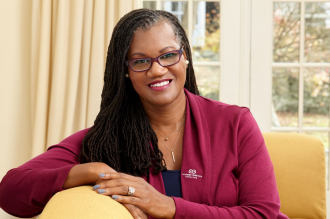“My mother used to be so good with words. She was a teacher. Now, watching her struggle to express herself is hard. She can’t really put a whole sentence together anymore.” This was the downcast observation of an adult daughter-turned-caregiver, juggling a full-time job as a corporate executive while raising a daughter of her own.
A woman who once was independent, inquisitive and funny had become quiet, unsure and scared. The daughter lamented not only that change but the transformation in their relationship. Once the daughter had relied on her mother for guidance. Now she was experiencing a role reversal.
Many families across our region are managing care for loved ones. According to the New York State Department of Health, 4.1 million people provided this type of informal care in 2021. In Connecticut, the Family Caregiver Alliance reported 3.5 million informal caregivers in 2014. Today, national averages tell us that one in five Americans are family caregivers.
The life changes the daughter described above are not unusual, but they are stressful, confusing and draining. Like her, many face numerous challenges as family caregivers:
The sacrifices made can feel overwhelming or burdensome, which can lead to feelings of anger and resentment, if not managed.
Others may feel a strong sense of purpose and may choose to decrease work hours, change their living situations and sacrifice their personal lives to care for loved ones.
Neglect of your health can be the result of long-term caregiving. Many ignore their own care needs to prioritize the care recipients.
Advance planning can make the transition smoother as can keeping communication open and transparent among family members. When this is lacking, problems can result. Let’s look at a pseudonymous example to see how this plays out.
Eva and her family
Eva is an only child whose parents, Inger and Frank, both Holocaust survivors from Germany and Austria respectively, were kind and loving traditionalists. They saw parents as responsible for the younger generation, no matter the age. When Frank died suddenly at 75, a week before a planned 50th-anniversary celebration, Inger, devastated and grief-stricken, was thrust into an unfamiliar role.
Frank had been the sole breadwinner and the person in charge of all financial and legal decisions. Now Inger had to deal with everything, and she was reluctant to involve Eva. She didn’t want to burden her and it was important to her to do everything the way Frank would have wished.
At age 86, Inger began to experience mild cognitive impairment. She was forced to rely increasingly on her daughter’s help though she still tried to handle all the finances. By age 90 she began to show signs of dementia and the condition progressed. Eva found aides, parttime then live-in, sold her mother’s house when expenses became too great and took over all Inger’s medical, financial and legal matters.
“It would have been better to have been more involved early on,” Eva says. “Fortunately, though, my parents’ records were well-organized. I was able to assemble a caregiving team. At least I knew that my mother had caring and compassionate care until the very end and I was able to be there for her.”
The ‘Sandwich Generation’ and Carolyn
Caring for a loved one can become complicated when the caregiver is a member of the so-called ‘Sandwich Generation,” a parent who is also the child of an aging parent in need of help.
Carolyn considers herself “blessed because my mother had her mental capacity throughout.”
Still, juggling a household, a demanding job and the needs of three children — a preteen son and two teenage daughters — became taxing. Carolyn always made sure that everyone had her phone number and assigned tasks. Her husband prepared dinner, the kids set the table, she came home in time to finish the cooking and serve.
Says Carolyn, “My husband was always there for the kids, but he wasn’t the confidant. I needed to be tuned in to my children’s lives. For me, missing their music lessons and concerts was heart-wrenching. Once the girls got their licenses, I’d worry until they came home. You can’t be a mother part-time. The only rest comes when everyone is in bed.”
As her mother had congestive heart failure, Carolyn was always on call and ready to dart out at a moment’s notice, sometimes in the middle of the night. It didn’t help that her mother lived in Brooklyn and Carolyn’s family was an hour and a half away in north-central New Jersey.
“With my mother’s condition, I never knew which incident would be the critical one,” Carolyn says. “I remember driving at 3 a.m. and crying on my way to her once. My children were forgiving. They loved their grandmother dearly and knew she had always been there for them as were my husband and me. They understood that I had to prioritize.”
Ease the stress
Following a few tips may help family caregivers manage changing relationships along with the ensuing stress:
Take a break to recharge your batteries. Respite care can be a vital part of family caregiving. It provides an opportunity for the caregiver and the loved ones being cared for to have space.
Build a team within your network. Whenever possible, don’t try to go it alone. Invite family members and sometimes close friends into plans. Delegate, delegate, then delegate some more.
Assemble a team outside of your inner circle. Surround yourself with a personal care team that can include a geriatric care manager, mental health person, a spiritual adviser, a caregiver support group and other friends, possibly neighbors. You may need to expand this to include a financial adviser, lawyer and other professionals. Having this sort of team can help caregivers assess and address their own needs.
Identify the activities that you and your loved one enjoy and can still do together. Remember and, if possible, recreate joyful times. Look through old photographs, watch favorite TV shows or films together.
Family caregiving is not all about struggle. It can be a purposeful and rewarding time of life. Yet we must always remember to care for ourselves as we care for those we love and manage changing relationships.
For more, visit
concierge-care.com.


